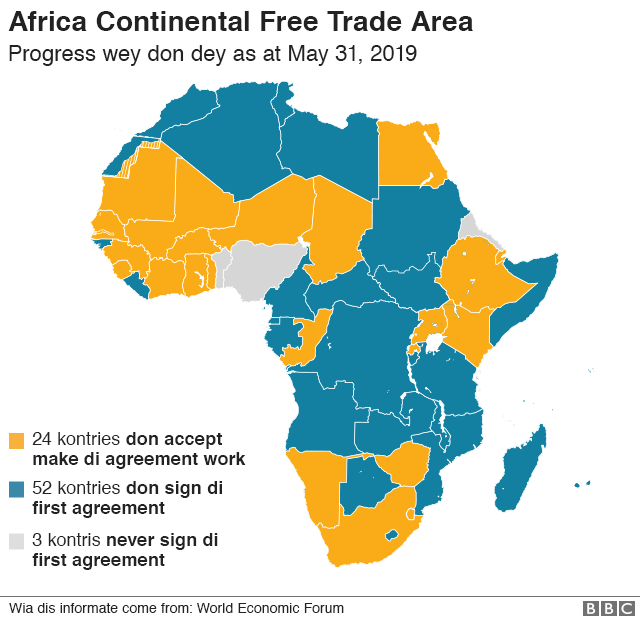Introduction:
In a world grappling with economic challenges and geopolitical uncertainties, the African Continental Free Trade Agreement (AfCFTA) emerges as a beacon of hope for the continent’s resurgence. This groundbreaking agreement, signed in 2018 and implemented in 2021, carries the profound promise of unleashing Africa’s immense economic potential and transforming the lives of millions. As the largest country in Africa, Nigeria stands at a pivotal juncture, poised to reap the boundless benefits that AfCFTA offers.

Image: www.bbc.com
With a market of over 200 million people and a GDP of over $500 billion, Nigeria occupies a central position in the African economic landscape. Its participation in AfCFTA presents an unprecedented opportunity to accelerate economic growth, create jobs, and enhance competitiveness. However, capitalizing on these benefits requires a comprehensive understanding of the agreement and the strategic positioning of key industries. This article delves into the significance of AfCFTA for Nigeria, exploring its potential impacts and charting a path for harnessing its benefits.
Economic Growth and Diversification:
AfCFTA aims to create a single African market for goods and services, eliminating tariffs and nontariff barriers to trade. By integrating national markets into a larger regional market, AfCFTA fosters economies of scale, reduces transaction costs, and enhances competitiveness. Nigeria, with its vast natural resources, robust manufacturing sector, and growing services industry, is well-positioned to benefit from these market opportunities. By reducing barriers to trade, AfCFTA will stimulate economic growth, boost productivity, and attract foreign investment. Furthermore, it will encourage diversification, reducing reliance on a narrow range of commodities and mitigating economic vulnerabilities.
Job Creation and Skills Development:
The expansion of trade under AfCFTA will lead to increased economic activity, resulting in the creation of new jobs across various sectors. Nigeria’s large workforce presents an abundant pool of talent that can be harnessed to meet the growing demands of the regional market. AfCFTA will promote the development of skills and expertise in sectors such as manufacturing, services, and logistics. This, in turn, will contribute to social mobility and improved living standards for millions of Nigerians.
Industrialization and Value-Addition:
AfCFTA provides an impetus for industrialization and value-addition in Nigeria. By facilitating the free flow of goods, the agreement will enable Nigerian manufacturers to access larger markets and scale up their operations. This will promote investment in manufacturing infrastructure, technology adoption, and innovation, leading to increased productivity and enhanced competitiveness. Nigeria’s textile industry, for example, has the potential to become a regional powerhouse under AfCFTA, catering to the growing demand for quality textiles across Africa.

Image: foreignpolicy.com
Increased Foreign Direct Investment:
The creation of a single African market will make Nigeria a more attractive destination for foreign direct investment (FDI). Investors will be drawn to the vast market opportunities, abundant resources, and skilled workforce that Nigeria offers. Increased FDI will bring in capital, expertise, and technology, contributing to economic growth, job creation, and industrial development. Nigeria must prioritize the development of infrastructure and a conducive business environment to attract and retain FDI.
Challenges and the Way Forward:
While AfCFTA presents immense opportunities for Nigeria, it also poses some challenges. These include the need to address infrastructure gaps, enhance trade facilitation, and strengthen border management. The Nigerian government, in collaboration with the private sector and stakeholders, must invest in improving road, rail, and air connectivity within the country and with neighboring countries. Modernizing customs procedures, reducing bureaucracy, and investing in trade facilitation infrastructure will streamline cross-border trade and reduce transaction costs.
Additionally, Nigeria must focus on export diversification to avoid over-reliance on a few commodities. By promoting value-addition and developing new industries, the country can maximize its export potential and reduce vulnerability to global commodity price fluctuations. The development of human capital and the acquisition of skills in high-value sectors will also be crucial for Nigeria to reap the full benefits of AfCFTA.
Africa Free Trade Agreement Nigeria
Conclusion:
The African Continental Free Trade Agreement (AfCFTA) ushers in a new era of economic empowerment and integration for Africa. For Nigeria, AfCFTA represents an unparalleled opportunity to harness the continent’s collective might and unlock its economic potential. By embracing the opportunities presented by the agreement, Nigeria can accelerate economic growth, boost job creation, stimulate industrialization, and attract foreign direct investment. However, realizing these benefits requires a comprehensive strategy that addresses challenges, promotes economic diversification, and strengthens trade facilitation. With careful planning, effective implementation, and the unwavering commitment of all stakeholders, Nigeria can seize the transformative power of AfCFTA and emerge as a leading economic force in Africa and beyond.






